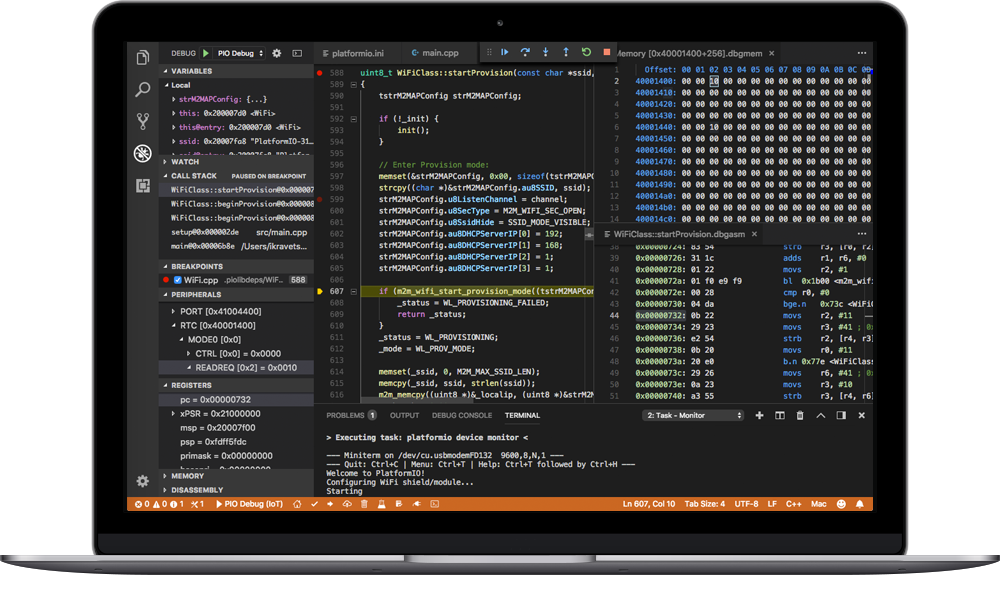➜ calculator git:(develop) pio test -v -e native
Collected 3 items
Processing test_common in native environment
----------------------------------------------------------------------------------------------------
Building...
LDF: Library Dependency Finder -> http://bit.ly/configure-pio-ldf
LDF Modes: Finder ~ chain, Compatibility ~ soft
Found 1 compatible libraries
Scanning dependencies...
Dependency Graph
|-- <calculator> (/Users/lucian/Projects/open/platformio-examples/unit-testing/calculator/lib/calculator)
Building in release mode
g++ -o .pio/build/native/program .pio/build/native/test/test_common/test_calculator.o .pio/build/native/test/tmp_pio_test_transport.o -L.pio/build/native .pio/build/native/lib40d/libcalculator.a .pio/build/native/libUnityTestLib.a
ld: warning: ignoring file .pio/build/native/lib40d/libcalculator.a, building for macOS-x86_64 but attempting to link with file built for macOS-x86_64
ld: warning: ignoring file .pio/build/native/libUnityTestLib.a, building for macOS-x86_64 but attempting to link with file built for unknown-unsupported file format ( 0x21 0x3C 0x61 0x72 0x63 0x68 0x3E 0x0A 0x2F 0x20 0x20 0x20 0x20 0x20 0x20 0x20 )
Undefined symbols for architecture x86_64:
"_UnityAssertEqualNumber", referenced from:
test_function_calculator_addition() in test_calculator.o
test_function_calculator_subtraction() in test_calculator.o
test_function_calculator_multiplication() in test_calculator.o
test_function_calculator_division() in test_calculator.o
"_UnityBegin", referenced from:
process() in test_calculator.o
"_UnityDefaultTestRun", referenced from:
process() in test_calculator.o
"_UnityEnd", referenced from:
process() in test_calculator.o
"Calculator::add(int, int)", referenced from:
test_function_calculator_addition() in test_calculator.o
"Calculator::div(int, int)", referenced from:
test_function_calculator_division() in test_calculator.o
"Calculator::mul(int, int)", referenced from:
test_function_calculator_multiplication() in test_calculator.o
"Calculator::sub(int, int)", referenced from:
test_function_calculator_subtraction() in test_calculator.o
ld: symbol(s) not found for architecture x86_64
clang: error: linker command failed with exit code 1 (use -v to see invocation)
*** [.pio/build/native/program] Error 1
==================================== [FAILED] Took 0.63 seconds ====================================
Processing test_desktop in native environment
----------------------------------------------------------------------------------------------------
Building...
LDF: Library Dependency Finder -> http://bit.ly/configure-pio-ldf
LDF Modes: Finder ~ chain, Compatibility ~ soft
Found 1 compatible libraries
Scanning dependencies...
Dependency Graph
|-- <calculator> (/Users/lucian/Projects/open/platformio-examples/unit-testing/calculator/lib/calculator)
Building in release mode
g++ -o .pio/build/native/program .pio/build/native/test/test_desktop/test_calculator.o .pio/build/native/test/tmp_pio_test_transport.o -L.pio/build/native .pio/build/native/lib40d/libcalculator.a .pio/build/native/libUnityTestLib.a
ld: warning: ignoring file .pio/build/native/lib40d/libcalculator.a, building for macOS-x86_64 but attempting to link with file built for macOS-x86_64
ld: warning: ignoring file .pio/build/native/libUnityTestLib.a, building for macOS-x86_64 but attempting to link with file built for unknown-unsupported file format ( 0x21 0x3C 0x61 0x72 0x63 0x68 0x3E 0x0A 0x2F 0x20 0x20 0x20 0x20 0x20 0x20 0x20 )
Undefined symbols for architecture x86_64:
"_UnityAssertEqualNumber", referenced from:
test_function_calculator_addition() in test_calculator.o
test_function_calculator_subtraction() in test_calculator.o
test_function_calculator_multiplication() in test_calculator.o
test_function_calculator_division() in test_calculator.o
"_UnityBegin", referenced from:
_main in test_calculator.o
"_UnityDefaultTestRun", referenced from:
_main in test_calculator.o
"_UnityEnd", referenced from:
_main in test_calculator.o
"Calculator::add(int, int)", referenced from:
test_function_calculator_addition() in test_calculator.o
"Calculator::div(int, int)", referenced from:
test_function_calculator_division() in test_calculator.o
"Calculator::mul(int, int)", referenced from:
test_function_calculator_multiplication() in test_calculator.o
"Calculator::sub(int, int)", referenced from:
test_function_calculator_subtraction() in test_calculator.o
ld: symbol(s) not found for architecture x86_64
clang: error: linker command failed with exit code 1 (use -v to see invocation)
*** [.pio/build/native/program] Error 1
==================================== [FAILED] Took 0.66 seconds ====================================
Test Environment Status Duration
------------- ------------- -------- ------------
test_common uno IGNORED
test_common nodemcu IGNORED
test_common native FAILED 00:00:00.631
test_desktop uno IGNORED
test_desktop nodemcu IGNORED
test_desktop native FAILED 00:00:00.660
test_embedded uno IGNORED
test_embedded nodemcu IGNORED
test_embedded native IGNORED
============================== 2 failed, 0 succeeded in 00:00:01.291 ==============================
➜ calculator git:(develop) gcc --version
Configured with: --prefix=/Applications/Xcode.app/Contents/Developer/usr --with-gxx-include-dir=/Applications/Xcode.app/Contents/Developer/Platforms/MacOSX.platform/Developer/SDKs/MacOSX.sdk/usr/include/c++/4.2.1
Apple clang version 11.0.3 (clang-1103.0.32.62)
Target: x86_64-apple-darwin19.6.0
Thread model: posix
InstalledDir: /Applications/Xcode.app/Contents/Developer/Toolchains/XcodeDefault.xctoolchain/usr/bin
Any suggestion is more than welcome. Thank you!






